On talking with some of my undergraduate students, they were keen to know my opinion on which have been the most useful general text books for a degree in human geography. Obviously modules will differ across universities and reading lists will be extensive, but for a general overview of the key ideas, skills and concepts in human geography this list should provided a broad introduction. 1) The Dictionary of Human Geography 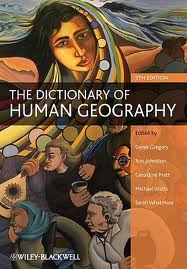 An indispensable book throughout my undergraduate degree, particularly in the first year when it feels like a lot of terminology is being thrown at you. Gregory, D., Johnston, R., Pratt, G., Watts, M. and Whatmore, S. (2009) The Dictionary of Human Geography, London: Wiley-Blackwell 2) Key Concepts in Geography
An indispensable book throughout my undergraduate degree, particularly in the first year when it feels like a lot of terminology is being thrown at you. Gregory, D., Johnston, R., Pratt, G., Watts, M. and Whatmore, S. (2009) The Dictionary of Human Geography, London: Wiley-Blackwell 2) Key Concepts in Geography 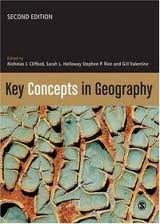 Clifford, N., Holloway, S., Rice, S., Rice, S., Valentine, G., (eds), (2008) Key Concepts in Geography, London: Sage 3) Approaches to Human Geography
Clifford, N., Holloway, S., Rice, S., Rice, S., Valentine, G., (eds), (2008) Key Concepts in Geography, London: Sage 3) Approaches to Human Geography 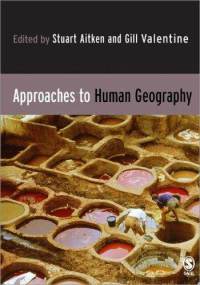 There are many ways we think about the key issues in Geography and depending on the areas of geography under consideration, there are a range of approaches which can be taken. More specifically the book covers: Philosophies, including Positivism; Humanism; Feminism; Marxism; Structuration Theory; Behavioral Geography; Realism; Post Structuralism; Actor-Network Theory; and Post Colonialism. There are sections on important people who have made signficant controbutions to Geography including: David Ley; Linda McDowell; and David Harvey. A great reference guide to have to hand. Aitken, S. and Valentine, G. (eds), (2006) Approaches to Human Geography, London: Sage 4) Conducting Research in Human Geography: Theory, Methodology and Practice
There are many ways we think about the key issues in Geography and depending on the areas of geography under consideration, there are a range of approaches which can be taken. More specifically the book covers: Philosophies, including Positivism; Humanism; Feminism; Marxism; Structuration Theory; Behavioral Geography; Realism; Post Structuralism; Actor-Network Theory; and Post Colonialism. There are sections on important people who have made signficant controbutions to Geography including: David Ley; Linda McDowell; and David Harvey. A great reference guide to have to hand. Aitken, S. and Valentine, G. (eds), (2006) Approaches to Human Geography, London: Sage 4) Conducting Research in Human Geography: Theory, Methodology and Practice 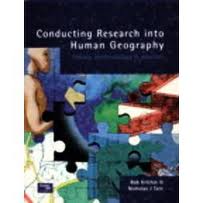 A great practical guide that any student conducting a piece of research (be it a dissertation or other project) should consult. It not only covers issues surrounding different methodological strategies but also some of the ideas surrounding the basics of research. Why we do research as geographers, and ways to think about the things that we do. Kitchin, R., and Tate, N., (2000) Conducting Research in Human Geography: Theory, Methodology and Practice, Harlow: Pearson 5) Geographies of Development: An Introduction to Development Studies
A great practical guide that any student conducting a piece of research (be it a dissertation or other project) should consult. It not only covers issues surrounding different methodological strategies but also some of the ideas surrounding the basics of research. Why we do research as geographers, and ways to think about the things that we do. Kitchin, R., and Tate, N., (2000) Conducting Research in Human Geography: Theory, Methodology and Practice, Harlow: Pearson 5) Geographies of Development: An Introduction to Development Studies  Very few human geographers will be able to complete their degree without considering the concept of development. This book provides an excellent introduction to the conceptualisation of development, but goes in to detail with a wealth of examples from across the globe, as well as discussing the spaces and places within which development takes place. Potter, R., Binns, T., Elliot, J., and D. Smith (2008), Geographies of Development: An Introduction to Development Studies, Prentice Hall: London 6) Key Thinkers on Space and Place
Very few human geographers will be able to complete their degree without considering the concept of development. This book provides an excellent introduction to the conceptualisation of development, but goes in to detail with a wealth of examples from across the globe, as well as discussing the spaces and places within which development takes place. Potter, R., Binns, T., Elliot, J., and D. Smith (2008), Geographies of Development: An Introduction to Development Studies, Prentice Hall: London 6) Key Thinkers on Space and Place 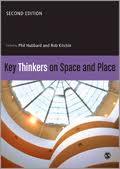 Covering over 65 key thinkers on space and place, two of the most central concepts to human geography. This is an essential book as a reference guide to some of the fundamental foundations to the discipline. Hubbard, P. and Kitchin, R. (2010), Key Thinkers on Space and Place, London: Sage
Covering over 65 key thinkers on space and place, two of the most central concepts to human geography. This is an essential book as a reference guide to some of the fundamental foundations to the discipline. Hubbard, P. and Kitchin, R. (2010), Key Thinkers on Space and Place, London: Sage
7) Geographies of Globalization: A Critical Introduction
Herod explains a number of critical perspectives on globalization in a very accessible manner covering issues considering: envisioning global visions; interpreting globalizations, talking globalization; globalizing empires; manufacturing globalization; governing globalization and globalizing labor. Overall an engaging overview of one of the key concepts and ideas in present day geography. Herod, A (2008) Geographies of Globalization: A Critical Introduction, London: Wiley-Blackwell
8) How to do your dissertation in Geography and Related Disciplines 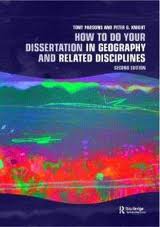 For many students, the dissertation seems like an incredibly daunting task, jumping from 2,000-3,000 word essay to a 10,000-12,000 research project. I think this book makes a great effort to address all the questions students have about doing a dissertation: What is a good dissertation? When should I start? What can I do with my data? and so on. It breaks down the dissertation into something manageable which can be approached in a systematic manner and provides a guide for the students from the beginnings of deciding a research topic to how it will be marked? A fabulous effort by the authors, a text all geography students should read before contemplating their research project. Knight, P., and Parsons, T. (2004) How to do your dissertation in Geography and Related Disciplines, London: Routledge 9) Global Shift: Mapping the Changing Contours of the World Economy
For many students, the dissertation seems like an incredibly daunting task, jumping from 2,000-3,000 word essay to a 10,000-12,000 research project. I think this book makes a great effort to address all the questions students have about doing a dissertation: What is a good dissertation? When should I start? What can I do with my data? and so on. It breaks down the dissertation into something manageable which can be approached in a systematic manner and provides a guide for the students from the beginnings of deciding a research topic to how it will be marked? A fabulous effort by the authors, a text all geography students should read before contemplating their research project. Knight, P., and Parsons, T. (2004) How to do your dissertation in Geography and Related Disciplines, London: Routledge 9) Global Shift: Mapping the Changing Contours of the World Economy  The most recent edition of a fabulous book. As David Harvey says:
The most recent edition of a fabulous book. As David Harvey says:
”A magnificent achievement. Since the publication of the first edition of Global Shift in 1986, Peter Dicken has constructed in successive editions a phenomenal record of the changing geography of capital accumulation on a world scale. This wholly new sixth edition of 2010, is an essential companion for anyone concerned to understand the rapid geographical shifts occurring in the world’s economic power relations in these stressful and troubled times”
Dicken, P. (2010) Global Shift: Mapping the Changing Contours of the World Economy, 6th ed. London: Sage
10) Qualitative Research Methods in Human Geography 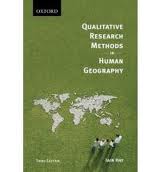 A great overview of why, and how, to use qualitative research in Geography. If you need an overview of the qualitative methods and tools available to researchers this is a great place to start. In all levels of my academic research I have found the chapters on power, subjectivity and ethics extremely valuable in helping to think about some of the underlying issues that are part of the research process. Hay, I. (ed), (2010) Qualitative Research Method in Human Geography, Oxford: Oxford University Press Are there any different books that would be in your top 10?
A great overview of why, and how, to use qualitative research in Geography. If you need an overview of the qualitative methods and tools available to researchers this is a great place to start. In all levels of my academic research I have found the chapters on power, subjectivity and ethics extremely valuable in helping to think about some of the underlying issues that are part of the research process. Hay, I. (ed), (2010) Qualitative Research Method in Human Geography, Oxford: Oxford University Press Are there any different books that would be in your top 10?









